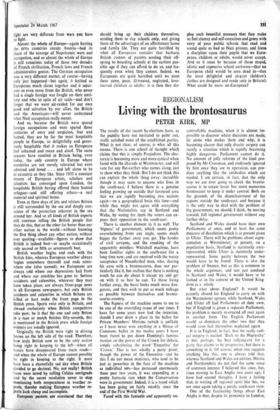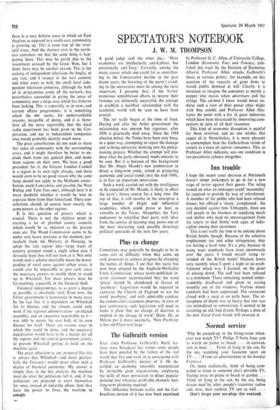Living with the brontosaurus
REGIONALISM PETER KIRK, MP
The results of the recent by-elections have, as the pundits have not hesitated to point out, really satisfied none of the established parties. What is not clear, of course, is what all this means. There is one school of thought which claims that this is simply Poujadisrn. The elec- torate is becoming more and more cynical when faced with the charade at Westminster, and will vote for any flat-earther who comes along, just to show what they think. But 1 do not think this can explain the whole thing away; incredible though it may seem to anyone who lives in the south-east, I believe there is a genuine feeling growing up outside that favoured area that we are rapidly becoming two nations again—on a geographical basis this time—and while they might not agree with everything that the Nationalists say in Scotland and Wales, by voting for them the voters can ex- press their opposition to the south-east.
There is another element in it as well. The 'bigness' of government, which seems pretty overwhelming from any angle, seems much bigger the farther away you get. The hordes of civil servants, and the creaking of the apparently mindless Whitehall machine, have been familiar sights in the south-east for a long time now, and are received with the weary acceptance of Neanderthal man, who, sharing his cave with a brontosaurus, does not par- ticularly like it, but realises that there is nothing much he can do about it except try and get on with it as best he can. To those living farther away, the beast looks much more dan- gerous, and they wish to put as much mileage as possible between themselves and bronto- saurus country.
The bigness of the machine seems to me to be one of the overriding issues of our times. I have for some years now had the intention, should I ever draw a place in the ballot for Private Members' Motions (which is unlikely as I have never won anything in a House of Commons ballot in the twelve years I have been there) to put down Dunning's famous motion on the power of the Crown for debate, simply substituting the word 'Executive' for 'Crown.' This is not wholly a party point; though the power of the Executive—and by this I do not mean ministers, who tend to be just as powerless in the face of the machine as individual mrs—has increased enormously these past two years, it was expanding at a pretty fantastic rate when the Conservatives were in government. Indeed, it is a trend which has been going on fairly steadily since the end of the rust World War.
Faced with this fantastic and apparently un- controllable machine, when it is almost im- possible to discover where decisions are made, let alone who makes them and why, it is becoming clearer that only drastic surgery can rectify a situation which is rapidly becoming highly dangerous. Parliament cannot do it. No amount of jolly reforms of the kind pro- posed by Mr Crossman, and studiously ignored by him once they are in operation, can pro- duce anything like the antibodies which are needed. I am certain, in fact, that the only way we are ever going to check the bronto- saurus is to create lesser but more numerous brontosauri to keep it under control. Both on the grounds of the disenchantment of the regions outside the south-east, and because it is the only way to deal with the problem of big government, we should, I think, be moving towards full regional government without any further delay.
Scotland and Wales should have their own Parliaments at once, and at least the same measure of devolution which is at present given to Ulster. There will be problems about repre- sentation at Westminster; at present, on a population basis, Scotland is statutorily over- represented, while Ulster is statutorily under- represented. Some parity between the two would have to be found. There is also the problem of finance, but as this is common to the whole argument, and not just confined to Scotland and Wales, it would have to be looked at in the context of the United King- dom as a whole.
But what about England? It would be patently absurd for England to carry on with the Westminster system, while Scotland, Wales and Ulster all had Parliaments of their own; but if England is given a separate Parliament, the problem is merely re-created all over again in another form. The English Parliament would so dominate the other two that they would soon feel themselves neglected again.
It is in England, in fact, that the really radi- cal surgery is needed. 'Back to the Heptarchy' is not, perhaps, the best rallying-cry for a party that claims to be progressive, but there is something in it. Of course, when one suggests anything like this, one is always told that, whereas Scotland and Wales are entities, Mercia and Northumbria do not feel the same sense of common interest I believed this once, but, since moving to East Anglia two years ago, I have had second thoughts. I have a feeling that, in writing off regional spirit like this. we are once again taking a purely south-east view.
One of the fascinating things about East Anglia is that, despite its proximity to London, there is a very definite sense in which an. East Anglian, as opposed to a south-east, community is growing up. This is even true of the over- spill areas. And the shortest visit to the north- east convinces me that the same thing is hap- pening there. This may be partly due to the resentment aroused by the Great Wen, but I think there may be another reason. This is the coming of independent television. In Anglia, at any rate, and I suspect in the west country and other areas as well, the small local inde- pendent television company, although the bulk of its programmes come off the network, has nevertheless succeeded in giving the sense of community over a large area which has hitherto been lacking. This is especially so in news and current affairs programmes; it is something which the Bac seems, for understandable reasons, incapable of doing, and it is there- fore all the more regrettable that the local radio experiment has been given to the Cor- poration, and not to independent companies who would probably identify much more.
The great conurbations do not seem to share this sense of community with the surrounding areas, and it might therefore be better to ex- clude them from any general plan, and make them regions on their own. We have a good precedent for it; the Greater London Council is a region in its own right already, and there would seem to be no good reason why the same thing should not apply to the Midlands conur- bation, south Lancashire, and possible the West Riding and Tyne-Tees ones, although here it is more doubtful whether it would be wise to separate them from thier hinterland. These con- urbations should, of course, have exactly the same powers as the other regions.
It is this question of powers which is crucial. There is not the slightest point in creating a lot of glorified county councils which would be as impotent as the present ones are. The Maud Commission seems to be under very heavy pressure at the moment, par- ticularly from the Ministry of Housing, to adopt the 'city region' idea—large tracts of country grouped round a single urban area. I devoutly hope they will not look at it. Not only would such a scheme inevitably mean the down- grading of rural areas against urban areas; it would also be impossible to give such areas the necessary powers to enable them to stand up to Whitehall. For these powers must be far-reaching, especially in the financial field.
Financial independence, to as great a degree as possible, is absolutely vital. Even now, the Ulster government is hamstrung in many ways by the fact that it is dependent on Whitehall for its finance, and the scheme could only work if the regional administration—an elected assembly, and an executive responsible to it— was able to secure the vast bulk of its own finance for itself. There are various ways in which this could be done, and the necessary equalisation would have to be a matter for all the regions and the central government jointly, to prevent Whitehall getting its hold on the machine again.
The great objection to any proposal like this is always that Whitehall—and more particu- larly the Treasury—would never allow such a degree of financial autonomy. My answer is simply that, in the last analysis, the machine must do what the politicians tell it, and, if the politicians are prepared to exert themselves for once, instead of tinkering about, then they have the power to force the machine to comply.



































 Previous page
Previous page